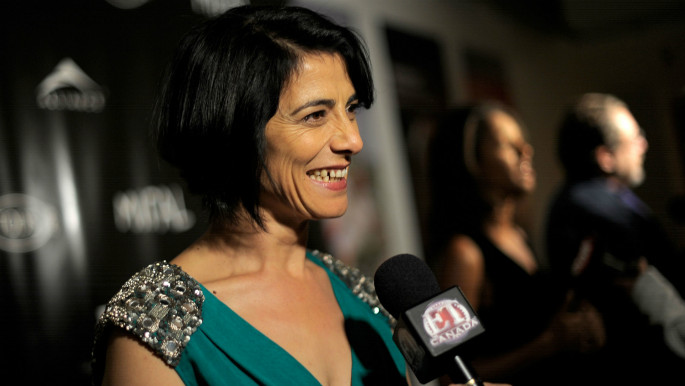Palestinian actress challenges cliches at Toronto film festival
She was nine in her village of Deir Hanna, in the Galilee in northern Israel, when she was asked to perform in front of local parents and families as the mother of a child who had just been killed.
"I remember that specific day, I really will never forget," the Palestinian actress recalled this week, during a live Q&A at the Toronto International Film Festival [TIFF], about cradling her "son" in her arms.
"I must have cried or did something very dramatic, or melodramatic maybe, and I just like finished and I looked at the people and all the people were crying," Abbas said. "And I said, wow. This works. This is so magic."
Abbass is one of the most recognisable and acclaimed Palestinian actors, with a filmography that literally spans the globe.
She delivered powerful performances as the mother of a Palestinian suicide bomber in Paradise Now, directed by Palestinian filmmaker Hany Abu Assad, and a widow tending to her lemon grove in the West Bank in The Lemon Tree.
And later, Abbass, who now calls Paris home, made the jump into European and US films, appearing in Steven Spielberg's Munich and Julian Schnabel's Miral.
She stressed that she values the relationships she has built with directors, and her ability to discuss, revise and build a character from the ground up is crucial.
 |
| Abbass also tried her hand at directing [Getty] |
In Paradise Now, for instance, Abbass said she did not like how her character was initially written, and she spent hours talking to Abu Assad about how to make the character different from the mothers of suicide bombers typically shown on television.
"From our connection, we succeeded to bring her character to be something different," Abbass said.
"And again, it's really about this kind of connection that happens with a director and the way he believes in you bringing something to his character."
In 2012, Abbass also tried her hand at directing. Inheritance looked at the conflict and tension boiling over inside a Palestinian family in the Galilee.
"One of the things that I hate to do is cliches, stereotypes," Abbas said. "I don't like to judge my characters and I don't like to judge the characters of others, and I think in my movie that was really one of the things that I avoided."
Abbass was at TIFF to promote Foreign Body, a film about the relationship between a young, Tunisian woman who lands in Paris without official papers, and the older, established French woman who takes gives her a job.
Abbass plays the older woman, Layla, who sees a version of herself in the younger Samia, and the pair enter into a tense, love triangle involving another young Tunisian, Imed, who has been in France without papers of his own for several years.
Directed by Tunisian filmmaker Raja Amari, the film raises important questions about what it takes to survive in difficult circumstances, and the masks people wear to do just that.
This is Abbass' second time working with Amari, after 2002's Satin Rouge, in which she played a widowed Tunisian mother who reinvents herself.
"It was such an important point in my life as an actress because it was an open invitation to have no limits," she said about the role.
Abbass said she and Amari share a disdain for cliches, and she praised the Tunisian filmmaker's ability to transform sensitive topics that are particular to Tunisian society into films that are accessible to everyone.
"I think there is something where somehow you connect the two cultures together and you live them anyway because you cannot separate from your past but your present is both," Abbass said.
"What I like is her sense of intelligence of how she could deal with very delicate subjects in an Arab society, because she knows her own society, the Tunisian society, and bring them to be a universal language - which is a movie."![Haim Abbass [Getty] Haim Abbass [Getty]](/sites/default/files/styles/image_345x195/public/media/images/499E96E5-1545-460D-9245-E41D5A426001.jpg?h=d1cb525d&itok=nSFor7hP)


